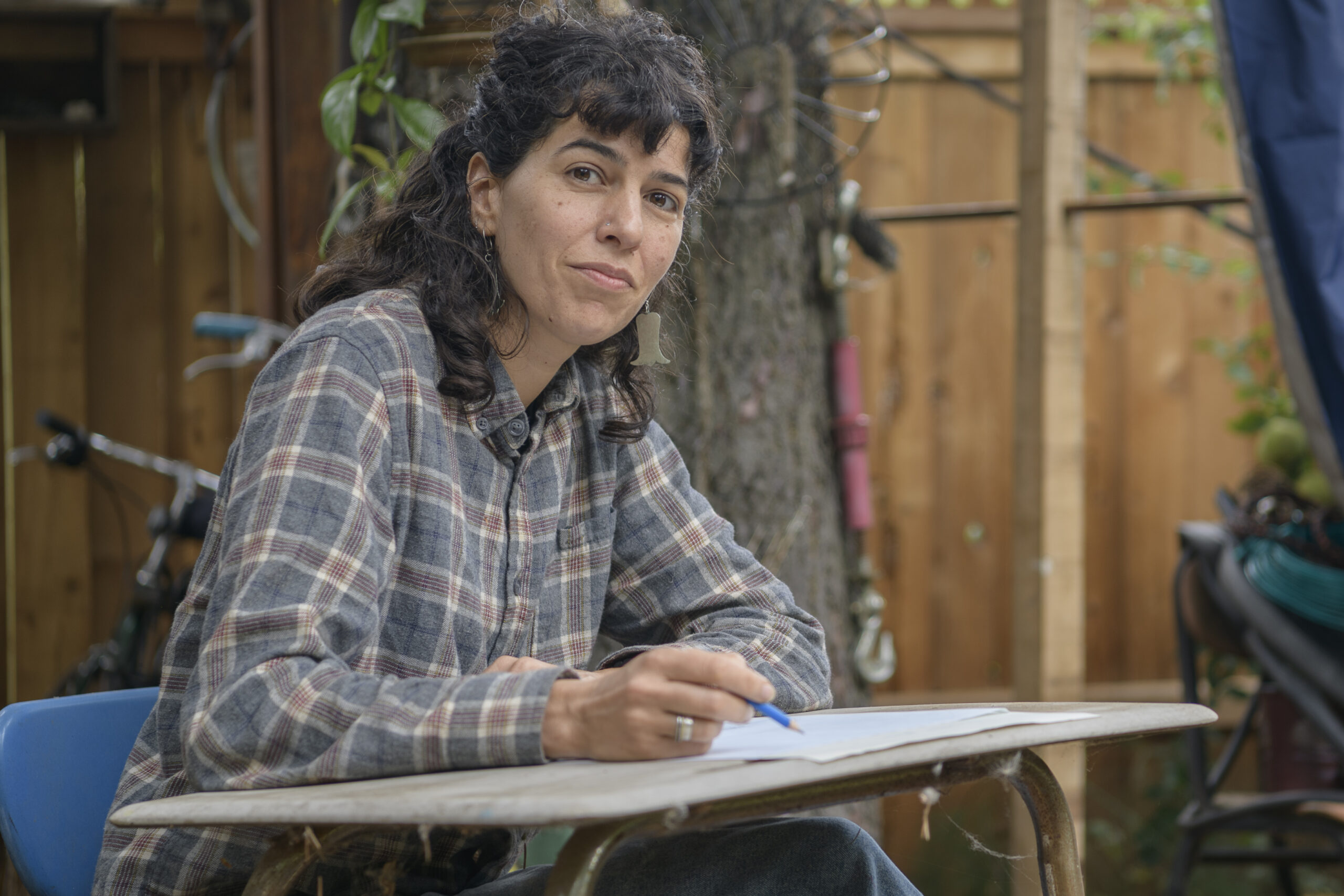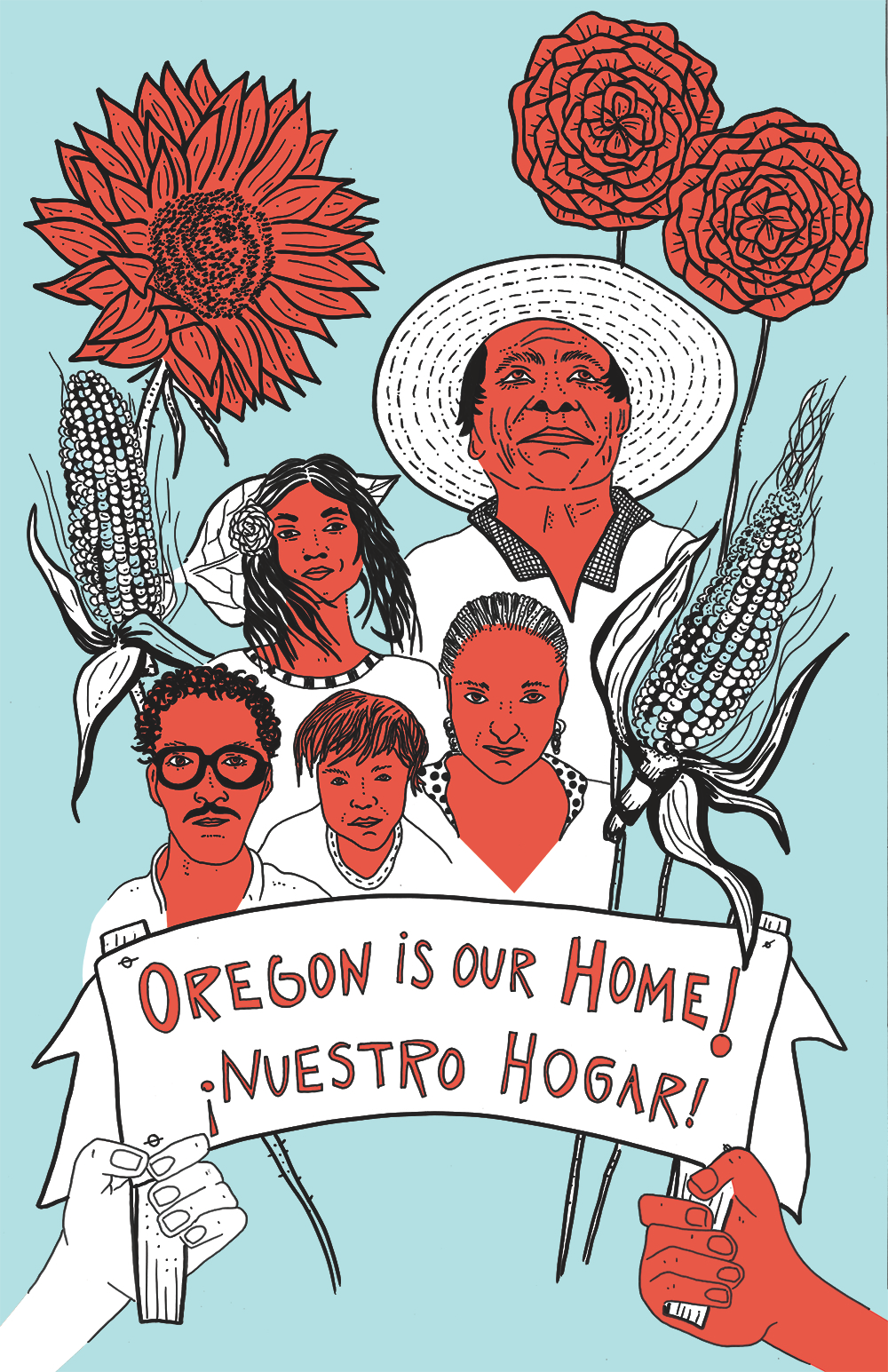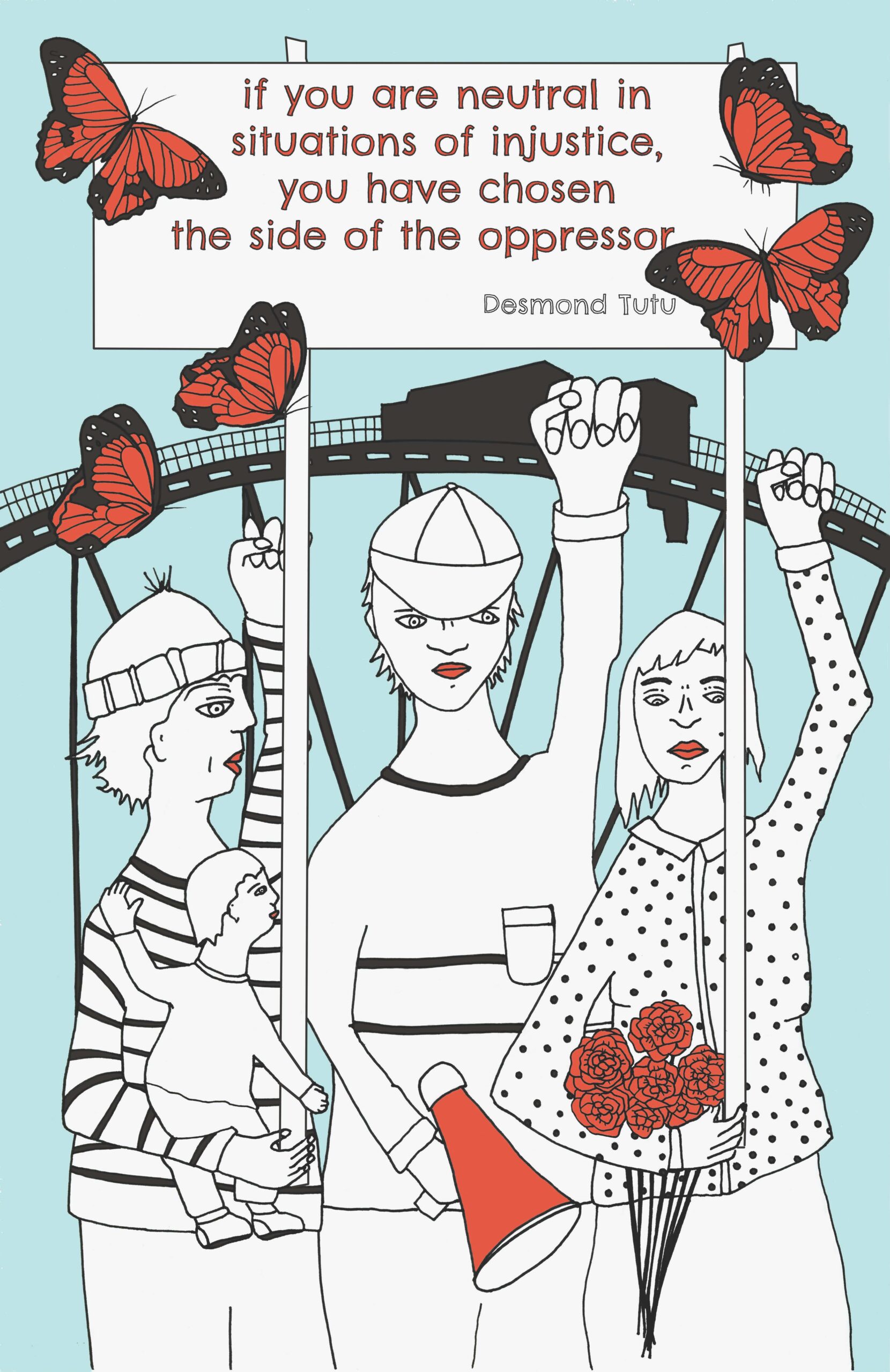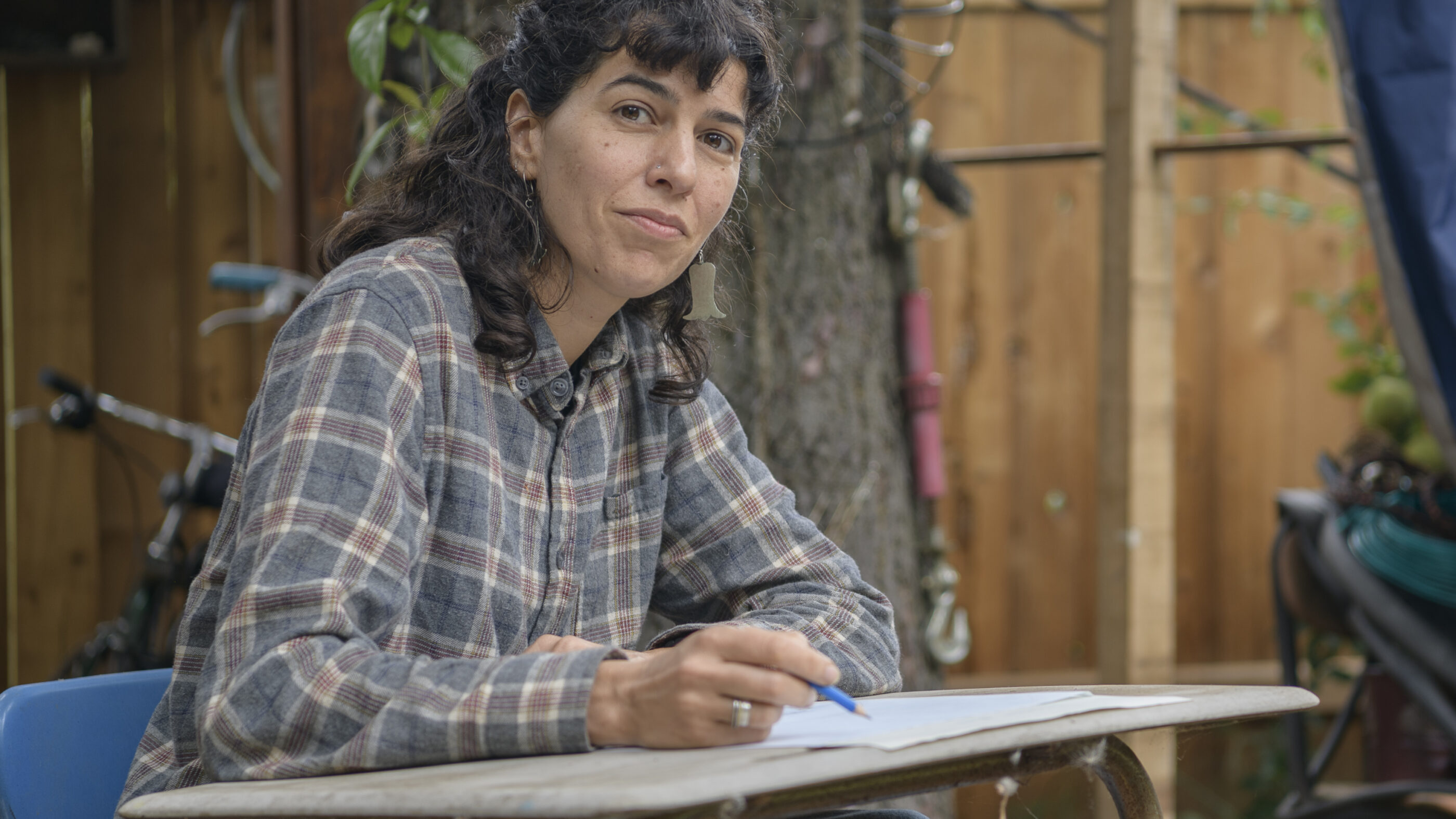
Virginia Marting is an illustrator, professional tattoo artist, performer, screenprinter, puppet maker, and much, much more. We are honored that she is a returning artist at Uncensored, our annual fundraiser that celebrates the fight for freedom for all people and free expression through posters designed by local artists. Uncensored will be held on Thursday, October 24, at the Lagunitas Community Room in Portland.
uncensored tickets are nearly sold out – get them while you can!
Born and raised in Rosario, Argentina, Marting has lived in Portland for the past 12 years, after living in Mexico, Spain, and Canada, with stops throughout the world. She’s always creating something new – whether that’s as a professional tattooist, a volunteer at the Independent Publishing Resource Center, or as part of local Latinx-focused artists’ collectives like PDXremembers, Ruda, and IDEAL PDX. You can visit her website here and her Instagram here.
How did you end up in Oregon?
My husband had lived in Portland previously. He thought I would like it here. I’m from Latin America and have been a human rights fighter since I was a teenager and I had a very bad image of the US due to their history of colonization and foreign affairs I wasn’t in love with the idea at first, but I met a lot of American people and it changed my perspective on living here. I found that the people are not like the government. I do like this place now and it’s my home after 12 years. It’s the place I’ve lived the longest by choice.
You’ve been fighting for human rights for a long time?
When I was living in Argentina. I was part of HIJOS, keeping memory alive about the last dictatorship in Argentina.We did a lot of work in the community, including weekly art workshops for kids in poor neighborhoods. I also worked with Coordinadora de Trabajo Carcelario, a human rights organization dedicated to the protection of the rights of persons deprived of liberty in the province of Santa Fe. Slowly, I’m trying to plug back into this kind of community involvement. I’m not a social worker, I’m not a lawyer. But from art I feel like I can do some things, and as a community member.
What do you believe is the connection between art and social justice causes?
As artists, we can choose to represent changes, raise awareness, and show and say things that need to be said and seen. That’s the place where art and social justice meet.
I’ve always been interested in the way art can speak truth to power. I am interested in the rise of street theater and performance art that really got going in the 70s here and Latin America where a lot of dictatorships were starting to appear, groups started to pop up in the street and make a scene from nothing, making people wonder what’s going on in front of them. They’d show up dressed as cops, but in a very obvious way where everybody knew they weren’t cops, and mock beating people up in the street so traffic is stopped. All of a sudden people couldn’t go by because people were in front of them showing a reality that they didn’t want to see. As a collective group, stopping a daily routine in the streets and bringing images that people don’t want to see but need to see.
You seem to be involved in many artistic things – what all do you do?
I’m a multidisciplinary artist with a main focus in visual arts. I explore different disciplines and techniques, finding myself coming and going between projects. Since I was young I use and enjoy different ways to express myself besides the verbal language. Today I dedicate my energy mainly to my visual work as an illustrator, tattoo artist, print maker and puppet maker and also as a puppeteer.
One collective for puppets started in a basement 20 years ago and I’ve been working with that group since I moved here 12 years ago. There’s a show we do in the winter called the Winter Solstice Puppet Show. Now it’s a very big thing and we bring two or three hundred people to each show and sometimes we need to do two shows in a night. It’s something that just happens once a year in the dark time. It is a moment where social justice and art come together because we focus on things we need to talk about as a society and community.
The last one I was involved in, it was about identity. That is something that was close to my heart because I am an immigrant, a person of color, though that’s new for me here as it’s a terminology that only Americans use. So we made a puppet show around identities and stereotypes. It was very healing for me and there were so many people that came to me to thank me for creating space for that conversation -- White people, people that were Chicano, people that were just arriving to this country. Everyone was like “wow this piece is really moving because it is something that we don’t talk enough about.”
Being here in the US, do you ever feel uncomfortable making yourself visible as an immigrant?
I used to feel that way. After Trump got elected, as an immigrant I felt more exposed. I like to go to protests. But all of a sudden I became afraid of being arrested. At that time I had residency status, so I wasn’t as active as I would have liked because I was fearful of not being able to renew my status because of a legal problem. That was one of the reasons I wanted to become a citizen. Now I am a citizen and feel more comfortable and if I get arrested they aren’t going to take my citizenship away.
Besides that, I can be a white-passing person if you don’t hear my accent. As soon as I start talking you notice I’m not from here, but in the streets I’m not a target, I feel, and that’s a privilege. It’s kind of weird — I feel I grew up as a white person in Latin America. I move here and all of a sudden I am not a white person any more, which is great, but I didn’t grow up being targeted or followed by the police because I look not how people want in the street to look. And I do have privilege even as an immigrant based on my status.

Last year you designed the “Oregon is our Home” poster (right), which was very popular. What was your thought process around that.
Last year Measure 105 was around and it was very scary for a lot of people. I felt as an immigrant I needed to stand with the immigrant community as much as possible. I wanted to make a piece that represented people wanting to stay in the same place. This is my home now and this is the home for a lot of other people, it doesn’t matter what their status is. The place that you are, the place that you work, that place that you raise your kids, where you make your relationships. You become part of that place and that’s your home.
What themes will you focus on for this year’s Uncensored?
I want to stand with the immigrant community, with all the stuff happening at the border, the concentration camps with the kids, ICE arresting people and deporting them. And I wanted to work with this quote from Desmond Tutu: “If you are neutral in situations of injustice, you have chosen the side of the oppressor."
What would you say to other artists about participating in the ACLU of Oregon’s Uncensored event?
As an artist, it’s great to have the opportunity to do Uncensored, to work collectively and put your ego away to be part of a bigger thing.The ACLU wanting to work with artist is amazing and great. It is a very powerful tool to express some of the issues the ACLU works on through art. It’s just great that they call on people working in art to work with them. I think it’s super powerful. And with the theme of justice, there are so many places you can go.
Limited-edition prints of Virginia Marting's 2019 poster (below) will be on sale to benefit the ACLU of Oregon at Uncensored on October 24.



